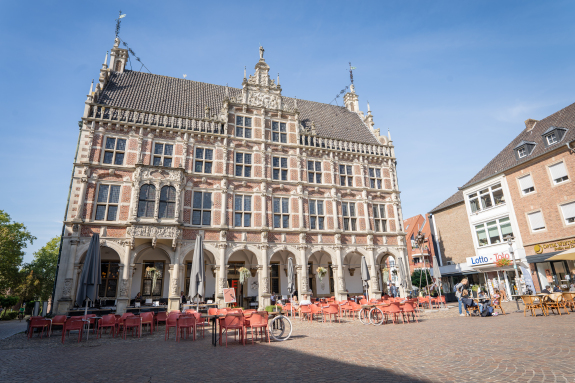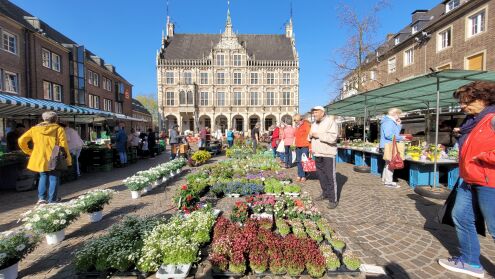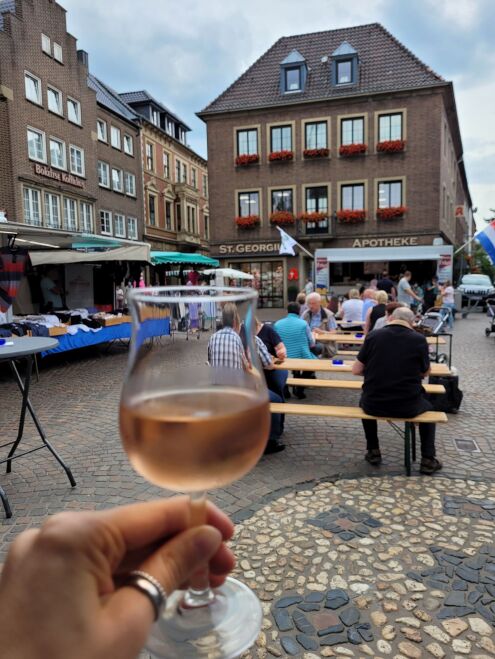City portrait - That's Bocholt!
The town of Bocholt is located in the western Münsterland region in the north-west of North Rhine-Westphalia and, with 71,000 inhabitants, is the largest district town in the Borken district.
Bocholt was first mentioned in 779 and although many historic buildings and parts of the infrastructure were largely destroyed by bombs in the Second World War in March 1945, the medieval town structure is still clearly visible.
The former city wall as well as the four trade routes leading in all directions are still recognisable as such by their course or their street names, e.g. Ostwall, Nordwall, Südmauer, Ostmauer. All four streets meet in the historic centre, with the market square, the Historic Town Hall and St. George's Church. The Historic Town Hall was built between 1618 and 1624 in the style of the Dutch Renaissance. The Gothic St. George's Church (1415) lies at the back of the town hall and seems to support it with its impressive architecture and high steeple that watches over the town.
But the city of Bocholt is not only known for its historic buildings, but also for its people. Near the church and the town hall, for example, you will find the birthplace of the famous goldsmith and engraver Israhel von Meckenem (c. 1440-1503). Bocholt's history is impressively recorded in museums and by wonderful sights in and around the town.
The city museum documents facts and figures about, among other things, Bocholt's history, geography and culture, while the textile museum traces the city's successful industrial past. With its steam engines and looms still in working order, the museum creates a very authentic atmosphere that is not at all rusty or dusty, but attracts thousands of visitors every year.
In recent years, Bocholt has developed into an important economic centre in the western Münsterland region. The town is ideally situated between the industrial belt on the Rhine and Ruhr and the Dutch industrial centres of Arnhem and Enschede.
Not only for industry, but also for education, Bocholt has an excellent position with institutions such as the adult education centre, the music school and the Westphalian University of Applied Sciences. The latter offers courses such as Information and Communication Technology, Mechatronics and Business Studies. Bookworms and bibliophiles get their money's worth in the generously designed media centre.
Bocholt invests in its infrastructure to make the city more accessible and attractive for residents and guests. Bocholt can be reached easily and quickly by almost all means of transport and is known far beyond the borders of Münsterland for its openness, accessibility and cosy atmosphere.
Numbers, data, facts
|
City coat of arms: |
Beech |
|
Town charter: |
since 1222 |
|
Inhabitants: |
approx. 71,000 |
|
Federal state: |
North Rhine-Westphalia |
|
Government district: |
Münster |
|
District: |
Borken |
|
Vehicle registration number: |
BOH, BOR |
|
Districts: |
11 |
Video: This is Bocholt
"Springboard" to the Netherlands
The proximity to the Dutch border in the northwest is one of Bocholt's advantages. This geographical location stimulates contacts between two nations and underlines Bocholt's image as a European city. The city cares a lot about a European flair and has friends all over Europe. Bocholt is the twin town of Rossendale (Great Britain), Aurillac (France), Bocholt (Belgium) and Akmene in Lithuania.
There are also relations with the Albanian city of Vlora. Furthermore, the Chinese city of Wuxi is one of Bocholt's valued partners. The Europe Fountain on the market square in the heart of Bocholt symbolises these close intercultural and cross-border friendships. In recognition of all its efforts to become an "open-border" city, Bocholt was awarded the Europe Prize in 1993.
Because of this openness and European atmosphere, Bocholt's tourism flourishes. The beautiful landscape and the well-developed cycle paths with a total distance of 200 kilometres attract cycle tourists . Bocholt has already been honoured several times with the title "Most Bicycle-Friendly City in Germany" (population under 100,000).
But the city offers not only fun and space for bicycle lovers, but also for many other leisure enthusiasts. Bocholt invites you to go for a walk and relax in the city forest with its game reserve and old trees. In addition, refreshment in the cool water is tempting; the Aasee offers countless possibilities for water sports enthusiasts, as well as a skate park, miniature golf course and a climbing garden for children in the shade of the large trees. An alternative is the Bahia adventure pool, which invites you to relax or play with its numerous saunas, water slide and fun pools.
In addition to leisure activities and cultural offerings, Bocholt also offers stylish shopping opportunities. The town strikes a balance between big-city flair with the shopping arcades and Neutorplatz and regional retail with small boutiques and shops against the backdrop of the historic town centre. Shopping opportunities are enhanced by the weekly market (four times a week) and occasional flea and flea markets.
Shop, celebrate and enjoy
Bocholt is a great place to enjoy life: There are many cafés, ice cream parlours and restaurants. Culinary delights await on every corner. In addition to Italian, Chinese, Greek and Eastern European cuisine, the city proudly presents its local Westphalian specialities such as Knockepott (stew pot with pork, onions and spices) or buckwheat pancakes with bacon and turnip cabbage.
If you would like to round off your shopping spree, extensive bike ride or interesting museum visit with a drink, you are sure to find a bar to your taste on the pub mile in the Ravardiviertel .
Entertainment is very important in Bocholt. Every season has its own festive highlight. Events include the St. Martin's procession in November, the Christmas market in December, the colourful carnival in February/March, the wine festival and town festival in summer and the funfair in October, which is well-known and popular beyond Bocholt's borders. The sweet smells, the fresh beer, the resounding music and the glittering lights of the rides and stalls create a unique experience for young and old. Bocholt also offers theatre, cabaret, cinema and open-air concerts.
A lively and cosy, an entertaining and relaxing, a historical and modern town awaits you - welcome to Bocholt!







